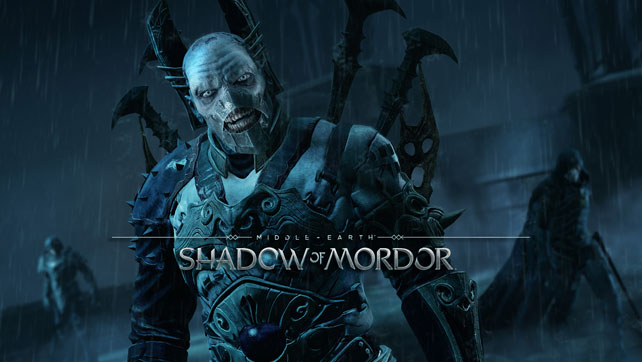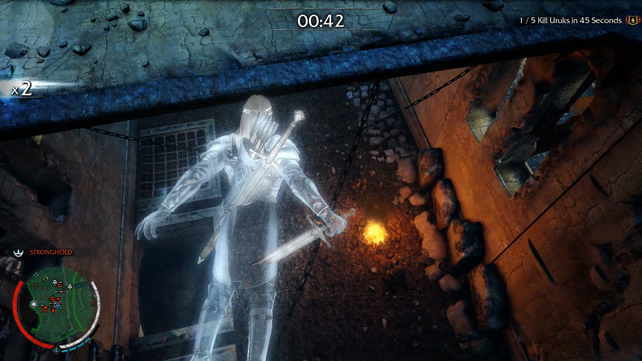Developed by Monolith Productions and published by Warner Brothers Interactive Entertainment, Middle-Earth: Shadow Of Mordor is an action adventure game that centres around the half life of a Ranger, Talion, who has been denied access to the afterlife, but has been removed from the land of the living. With a healthy dose of pre-panning from the unwashed masses for being “a total Assassin’s Creed knock off”, if it’s truly be compared to anything, it’ll be closer to the recent series of Batman games… but ultimately, it’s not even that. Shadow Of Mordor is simply an amalgamation of some of the best and worst things in video games in the current times, as well as a healthy dose of something else entirely.
The best place to start is with, what I consider, the games primary failure: the story. Talion is a cypher. Nowhere near as much of a cypher as the likes of Aiden Pearce in Watch_Dogs, but a cypher nonetheless. Having been, not entirely inaccurately, dubbed by some as Beardy McLonghair, his personality is something I personally found so incredibly threadbare that even my own favourite voice actor in the business right now couldn’t breath much life into him. Across the five minute tutorial/opening cinematics, the story reveals the following information:
- Talion is a ranger.
- He has a son and a wife.
- A squad of Sauron’s Surly Sidekicks show up and kill Talion, his son and his wife.
Not being a big fan of Tolkien (much preferring Robin Hobb, Ursula LeGuin, Robert Jordan or the more recently popularized, George RR Martin), I can’t be 100% on this, though I’m fairly certain that prior to this game, neither Talion nor family ever existed in the world canonically or otherwise. I don’t know who they are or how they operated as a family outside of one sparring session and one stealthy kiss at the marketplace. Hell, I’d need to boot up the game right now just to be able to tell you their names. So, my question is this: Why do I care that they’ve been killed? Because they’re the family of the protagonist? How do I know he hasn’t been having an affair? How do I know that the content of a wizard’s sleeve hasn’t met the content of her wizard’s sleeve? How do I know that the son isn’t a Joffrey? A little bully that pulls the girls hair when the elders aren’t looking? I don’t. In fact, I don’t know a thing about these people and I never will. Somehow I’m supposed to empathise with them within minutes of their establishment for the entire duration of the story. The only saving grace here is that I, at very least, got to “see” the people I’m unable to empathise with. Hear that Ubisoft?
I get the distinct impression that this character has been so carelessly thrown together with an awful backstory of “I was a captain at the Black Gate” based mainly around the fact that something happened at the Black Gate, so that’s a big deal. The fact that the spectral entity he spends the majority of the game in the company of – who, even I know, would be a spoiler to reveal the identity of – is clearly a bigger deal than Talion could ever aspire to be. I’m guessing the hope is that, because of this, Talion himself is largely irrelevant. It’s safe to say that I’m definitely not a fan of that one aspect of the game, figuring actual LOTR fans might be able to get more of a kick out of the proceeding events. It’s also on the shorter end of the spectrum when it comes to game storylines. Being able to say that it could be finished within a single fake sick day with time left over for lunch and a pint… in the next town over. That gives me a perfect jumping in point for talking about the rest of the game.
Almost everything aside from the story is incredibly well put together. At one point I spent a whole two days worth of my limited, flu riddled gaming time simply running around getting sidetracked by everything on display – which is something very few games have ever succeeding in doing outside of MMOs. Of course, I’m talking about the much touted Nemesis system which breathes life and character into every single Uruk in Mordor. As an overwhelming number of them begin to get the better of you, failure to assess the situation is likely to get you taken down and the Uruk fortunate enough to deliver the killing blow is gifted with the potential to be the bane of your existence as he becomes promoted through the ranks with the goal of becoming a warchief. This gives them improved combat efficiency, weapons, strengths and even subordinates of almost equal measure willing to fight mercilessly beside them.
Yes, the Nemesis system is exactly what it seems everybody is saying about it, and then some. In a word, fantastic. You get a deep pool of personalities to delve into; names and characters, weapons – be it a simple sword, sword and shield, spear or crossbow. It’s safe to say that the true character development in the game is to be found here as they recall previous clashes they’ve had with you. Mocking you for your persistence or becoming enraged at the sight of you for the scars they now carry, delivered by your own sword. There is very little to dislike about the system, and it’s something that I sincerely hope a lot of other game developers take into account in the future considering I don’t see an end to games where we mow our way through torrents of otherwise indistinguishable enemies. In fact, this is something that would be right at home in something like Dynasty Warriors. But I digress.
The combat isn’t entirely dissimilar to Rocksteady’s Batman series in control, but is far from a direct imitation. It’s fluid, reactive and centers around countering and comboing to a charge level where certain abilities are unlocked. Which, in fairness, sounds a lot like Batman’s combat system. The difference here is in the fact that these alternate abilities are not restrained by the moral ramifications implied upon the character should they die. As such what stuck out here for me was the sheer level of brutality. I never knew there were so many ways to behead an Orc! What little of interest Talion has to say, his sword suddenly makes him a very interesting individual. The volume of enemies thrown at you can often be empowering to look at, especially when the camera pans in on one of them revealing them to be the fourth captain to enter the fray. The familiarity many will have with what’s going on will definitely be to their advantage, but enough is brought forth to stop it from being a walk in the park. In a word; satisfying.
Outside of combat, there is the stealth approach. Some, though not all, of the Captains can simply be assassinated. Approached carefully and quietly and snuffed out of existence before you can say “one cannot simply…” blah, you know the line. Ever aware of the brutality on display, there also comes the option to perform unique stealth executions that not only draw the attention of nearby Uruks, but also instill in them the fear that they will share the same fate. As the stealth approach supports slinking around strongholds – specific areas where orcs are found in greater numbers – you end up hearing conversations as to the fear, or lack thereof, of the Gravewalker. Your fight against Sauron’s army is not the only fight occurring on battlefield, however, as the possibility of promotion combined with the riled up nature of Orcs causes them to clash with one another, providing you with the opportunity to stifle the growth of particular bad eggs, or even aid those you wish to see climb in power. The reason for the latter becoming apparent toward the second half of the game. These encounters are constantly occurring and ignorance to that fact is well within your right, but neglecting the power plays means an Uruk out there could come back to haunt you another time. Naturally, you can’t do all of them all of the time, it just adds so much depth to the world , things are literally evolving around you.
As if this persistent meta content wasn’t enough, there’s the personal character growth. Killing Uruk Captains gives you Power, which goes towards a progression bar at the end of which you gain access to the next row of abilities, as well as Runes, which can be affixed to your weapons (Sword, Dagger and Bow) to bolster and add certain abilities. The runes are many and increase in value based on the challenge presented. How stylishly and varied you fight nets you Exp, and this goes towards a similar bar to the power bar, however, upon completion – you guessed it – you get an ability point. Certain abilities are gated by certain campaign missions, but suffice it to say that by the time you have them all, you’ll be pulling off some crazy moves.
Putting the story aside for what it is, the game itself is really, really well put together that only thinly eludes the potential to be amongst my favourite games of the year. There’s really not an amazing amount to do, but with so many ways to go about doing it, a lot of that stuff feels like a new experience despite it being close to the tenth repetition. When you embrace the atmosphere, which Shadow Of Mordor has in abundance, it really is a fantastic game.
Middle-Earth:Shadow of Mordor is available now on PS3, PS4, Xbox 360, Xbox One and PC.
The Verdict
Latest posts by Cevyn (see all)
- Other Places – October 8, 2014
- Important Voices In Video Game Culture – October 2, 2014
- Hemorrhoids Of Shame – September 25, 2014









